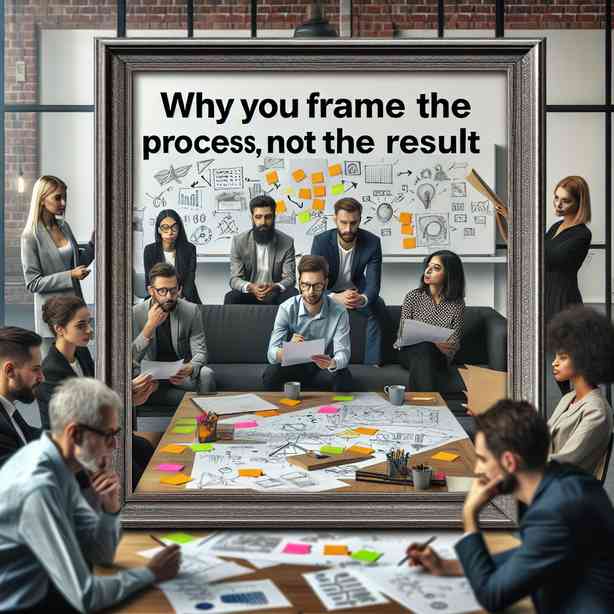
In today’s fast-paced world, there’s an increasing emphasis on outcomes – the tangible results of our efforts. Whether in our personal lives, at work, or within societal contexts, achieving specific goals is often viewed as the primary marker of success. However, what if we told you that framing the process is equally, if not more important than focusing solely on the end result? Understanding the significance of the process can transform your approach to challenges and lead to a more fulfilling journey.
When we speak about framing the process, we are referring to the mindset and strategies involved in how we approach our goals. This mindset encourages us to place emphasis on the steps we take, the skills we develop, and the lessons we learn along the way, rather than being solely fixated on the outcome. By adopting this perspective, we can foster a sense of growth, resilience, and adaptability.
One of the primary reasons framing the process is crucial is that it can significantly influence our motivation. When we focus on the process, we create a framework that values achievement through incremental progress. Celebrating small victories and recognizing the effort exerted can be incredibly motivating. For instance, if someone is training for a marathon, rather than obsessively fixating on the finish line, one could benefit immensely from appreciating the milestones reached during training, such as improving a running time or completing a personal best distance.
Moreover, embracing the process invites us to be more present. With a process-oriented mindset, we find ourselves engaged in the moment, optimizing our learning experiences. We naturally become more attuned to the skills we are developing and the experiences we are encountering, allowing for a deeper understanding of our capabilities and limitations. This mindfulness can lead to reduced anxiety and stress typically associated with high-pressure outcomes.
Framing the process encourages a learning-based attitude, where the focus is on improvement rather than perfection. In a world that often pushes for immediate results, it is healthy and productive to embrace a space that allows for mistakes and growth. Through a process-oriented approach, individuals experience a reduction in the fear of failure, as they come to recognize that failure itself can be a valuable teacher. Each setback provides valuable insights that can shape future endeavors, leading to unexpected, often significant growth.
In addition, emphasizing the process allows for a collaborative learning environment. When group tasks are approached with a focus on how to achieve success together, rather than merely reaching an end goal, team members are more inclined to share ideas, support one another, and learn from collective experiences. This cooperation fosters a community of resilience, where individuals can depend on one another, creating a supportive atmosphere that thrives on collaboration rather than competition.
Furthermore, many renowned experts across various fields reinforce the importance of process over results. For example, in the realm of academia, researchers often highlight the significance of methodology over mere findings. The effectiveness and validity of research rely on rigorous processes that ensure the data collected is robust and applicable. Likewise, in artistic endeavors, musicians and visual artists often counsel that the journey, the hours of practice, exploration, and experimentation shape the final product more than the product itself.
With this understanding, how can we practically implement a process-oriented mindset in our daily lives? Firstly, one can begin by setting specific, measurable, achievable, relevant, and time-bound (SMART) goals while shifting the focus toward the daily habits and routines that contribute to larger ambitions. This breakdown makes it easier to appreciate the daily progress rather than anxiously awaiting a distant goal.
Additionally, maintaining a reflective practice can greatly benefit those attempting to embrace a process-oriented mindset. By taking the time to journal or simply reflect on daily experiences, one can assess progress, recognize overcoming challenges, and identify learning opportunities. The act of reflection can impart a sense of accomplishment in mundane tasks that may otherwise feel insignificant.
Furthermore, adopting a growth mindset complements this new approach beautifully. A growth mindset—the belief that one’s abilities and intelligence can be developed with effort and persistence—aligns naturally with valuing the processes that lead to improvement. Recognizing challenges as opportunities and valuing efforts over innate talent encourages a more profound commitment to mastering one’s skills.
Lastly, sharing your journey with others can reinforce a focus on process. Whether it involves mentorship, discussing goals with friends, or even teaching a skill to someone else, articulating your experiences deepens your understanding and encourages others to appreciate their journeys as well. This communal aspect reinforces resilience, encouragement, and belief in the continuous journey of growth.
In conclusion, the importance of framing the process cannot be overstated. By shifting our focus from solely seeking results to valuing the journey we take to achieve those results, we cultivate a deeper understanding of ourselves and our capabilities. This process-oriented approach not only enhances our motivation and resilience but also encourages a sense of community and collective growth. As we embrace and cherish the intricate journey toward our goals, we discover that it’s not just about the destination; it’s also about the profound experiences, lessons, and connections we make along the way.


